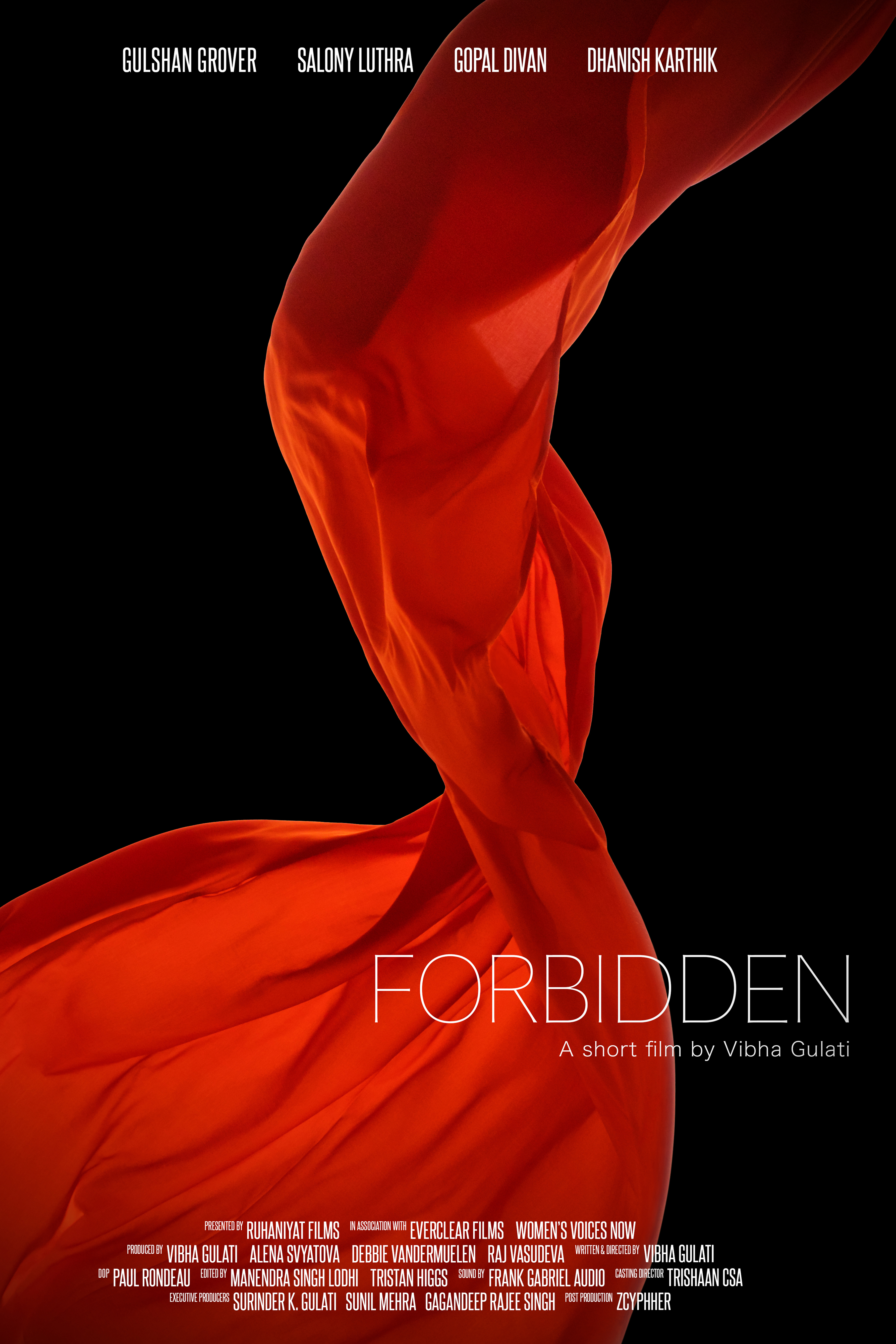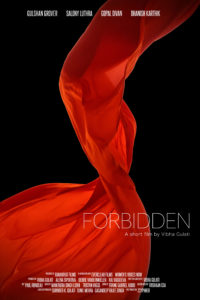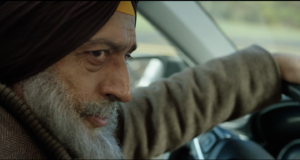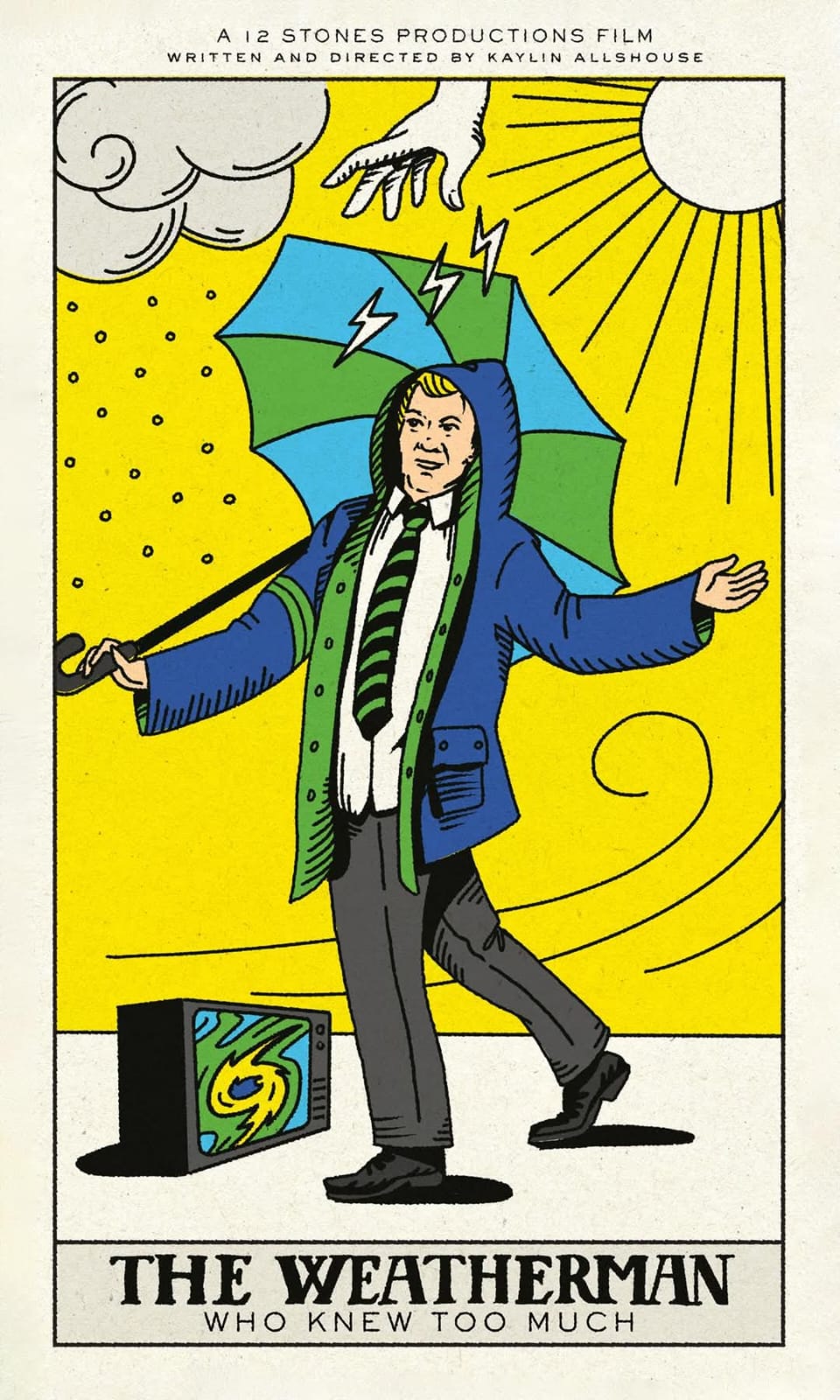
India Independent Short Film Review “Forbidden”
WATCH THE TRAILER HERE
First, the Recap:
A sense of virtue. Having worthiness in the eyes of those we prize most is a needed and healthy aspiration, assuming it is sought after with humbleness. This can especially be the case for seeking the loving approval of family when it comes to the choices we make that bear witness to our love for them, ourselves, and those we’ve deemed fit to share that love with for a lifetime. However, what happens when the pursuit of this esteem and assent defies rigid traditionalism, cultural expectation, and arranged pairing? This mentality resides in the mind of a young woman named Jasleen (Salony Luthra) even as she hurriedly gets in her boyfriend Fahwaz’s (Gopal Divan) SUV with purpose and excitedly giddy, albeit frantic, intent.
Even as the pair pull away from her family’s home, they begin to expound on their plans which demand a quick getaway, an extended time away together, and the literal fate of the future hanging in the balance. The conversations between them causes Jasleen to reminisce about childhood joys with her father (Gulshan Grover), though his current state of mind she seems so distracted about paints the picture of a less than happy man who has particular issue with his daughter’s decision to be with Fahwaz. As more truth about things comes to light, the situation turns decidedly tense and volatile, forcing a confrontation with both her father and her brother Manpreet (Dhanish Karthik) that spells nothing but misery–or worse.
Next, my Mind:
Intentionally provocative, viscerally evocative, candidly straightforward, and undeniably, searingly haunting in its underlying explorations of arranged vs. self-discovered happiness, honor/tradition/culture vs. real, heartfelt love, and defiance vs. obedience amidst the primary thematic backdrop of the horror that is honor killings, this 20-minute short film effort from writer/director/producer Vibha Gulati will most assuredly bring much needed awareness to its subject matter with raw precision and punch-in-the-gut potency. The beauty of its execution and presentation is found in the deft utilization of a mildly slow-burn build-up followed by a harrowing series of events that puts the entire narrative into a stirring but bluntly forceful focus meant to elicit emotional response from the viewer, which was accomplished for this critic when the story moved me to tears by the finale.
While we’ll all have varying reactions to any project we see and assess, having that aforementioned level of emotional impact, for me, is a total testament to the skills being brought to the table by Gulati, whom I can tell has a deep storyteller’s heart combined with that indie film willingness to tackle resonant subject matter with a fearless tenacity and commitment. Her characters are ones you can invest in, the dialogue remains convincing throughout, and the overall flow/pacing here is perfectly delivered, which only further accentuates Gulati’s abilities as both a writer and director. Additionally, as indicated above, Gulati’s means by which to evoke a tangible air of unsettled edginess as the story progresses is another indication of her prowess in the big chair, meant to pull the viewer along until revealing that ultimate objective which hits you with the force of a freight train.
Feeling the weight of what was being portrayed and realizing how truthful it all was when startling statistics are put on screen as an ultimate statement to emphasize the film’s ambitions and resolve, it reminds us of just how lost we are as a society. Any film, for me, that is based on actual events only serves to drive the objectives home, and that as well is also very much achieved here in a way that does make me hope it influences us all to take a closer, better, and more action-oriented look at what’s happening with honor killings and find the means to combat it, “tradition” and “culture” notwithstanding. Violence in any form, markedly towards women, will always be something that needs to be prevented and confronted, and this film certainly makes a point to encourage that. No matter what your heritage, ethnicity, beliefs, etc are, this hatred and animosity shouldn’t be, can’t be, condoned.
Yet, in the middle of chaos, the film vividly depicts the overwhelming power of all-encompassing love between two people who realize that nothing should stand in the way of what they can share together, regardless of the different yet similar worlds they herald from. Two human beings have connected in a way that we all actually desire, and to see how that plays out here is in itself inspiring and something to be attained, as they stand firm within for the love they share, despite the possibly tragic circumstances being faced because of it all. Visually, the film is crisply shot and follows the characters wonderfully as the story unfolds, helping through the imagery provided to pull the viewer in and create that air of subtle then undisguised tension. Basically, it’s totally character-centric, as great indie cinema is, and why it works so well in narrative-driven efforts like this one.
As often mentioned by me in reviews of indie films, the human element brought out in the stories offered are driven greatly by not just solid writing and direction, but by the actors who then bring it all to life through their performances, and this is definitely the case here starting with Luthra and her heartbreakingly emotive, fully realistic role as Jasleen, a beautiful, vibrant woman who’s had the fortune to have met the man of her dreams but the misfortune of him having come from a completely different religion, which has subsequently not sat well with her hardline traditional father. Refusing to bow to convention but rather more motivated overall to allow true love to rule her decisions, Jasleen absconds with her beau in a desperate move for the two of them to live happily together, despite his insistence she confront her father. Bearing fond memories of better days with her beloved Papaji, the frustration and anger at him for his displeasure with her choices leads to an even more intense and brutally affecting face-off that will have dire ramifications to all involved. Throughout, Luthra’s dramatic flare and believable delivery immerse us in Jasleen’s harried world with perfect effectiveness and indelible strength.
Divan brings a stalwart, resolute, and steadfast performance to the forefront in his role as Fahwaz, the Iranian boyfriend Jasleen’s heart has been taken by. More than willing to go against his own background’s ideologies and/or traditions for the sake of maintaining the love he shares with Jasleen, Fahwaz also carries a strong overall torch for the concept of family and the bonds that make it the important facet of life it is, encouraging his more than reluctant beau to talk things out with her father, even in view of what he surely knows could be a highly strained conversation she would be encountering. But, things take a much more difficult turn as the two try to make their way into a new life together, and Fahwaz may or may not end up having the decisions about the couple’s future taken away in a decidedly jarring way. Yet, he stands firm for Jasleen and himself, even as the events spin out of control, doing his level best to let reason win the day. Like the character of Jasleen, Divan plays Fahwaz with subtly building vigor as the film carries forward, and he does so with grounded realism and impassioned resonance from start to finish, a credit to the actor.
Grover exudes wonderfully ominous menace that belies the fact he’s really playing a loving father who only wants what he feels is best for his daughter according to their cultural conventions in his role as Papaji, Jasleen’s Dad whom has more than a few feelings about his child’s choice of men when already having chosen someone for her per their familial expectations. Even with the love he once had for her, his overt hatred and rejection of Jasleen consumes him to a point of definitively severe behavior that threatens both her and Fahwaz. Trying to understand why Jasleen has done this to their family, Papaji is so overwrought with malice towards the couple, the actions he feels are prudent and “right” are so misplaced and frankly wrong that it is genuinely difficult to empathize/sympathize with him in any way, which really to me is the entire point given the topic under scrutiny here. Even the moments he experiences when recalling the more innocent days with Jasleen as a child still don’t cover up his burning anger and discontentment with her now, much less the actions he takes. But, what we feel about the father’s character is also due to the excellent, wholehearted, fervent performance Grover turns in here, a notable one for the veteran actor.
Karthik also brings a steady, solid performance to his role as Manpreet, Jasleen’s brother who truly gets caught in the middle of the mess being created by his “wayward” (not really!) sister. Supporting her on one level yet then finding himself at the beck and call of his strong-willed, unforgiving father when having to face him about her whereabouts, Manpreet’s real nature comes out during the film’s finale, and we at least get an impression his own personal sense of rigidity may actually be far less strict in practice than his father, whom he still crumbles under when facing in his state of absolute agitation. Additional appearances are made in the film by James Gunn as a man Jasleen believes is more than he seems during a stop at a local gas station/convenience store the couple does along the way, Dolce Demce as a little girl at the same station, plus Vedika Saraswat as the childhood Jasleen.
In total, “Forbidden” is a film made to bring awareness, shape minds, and ideally become a catalyst for action when it comes to seeing an end brought about to honor killings and the associated violence towards women. What we need to realize, as the statistics at the end of the film indicate, is that this practice isn’t just something restricted to South Asia or the Middle East. It’s a worldwide epidemic that needs to be exposed and dealt with. Let’s face it–injustice needs to cease, and love must assuredly prevail if we wish to see this world transformed for the betterment of everyone. Films like this fire me up. How about you?
As always, this is all for your consideration and comment. Until next time, thank you for reading!




